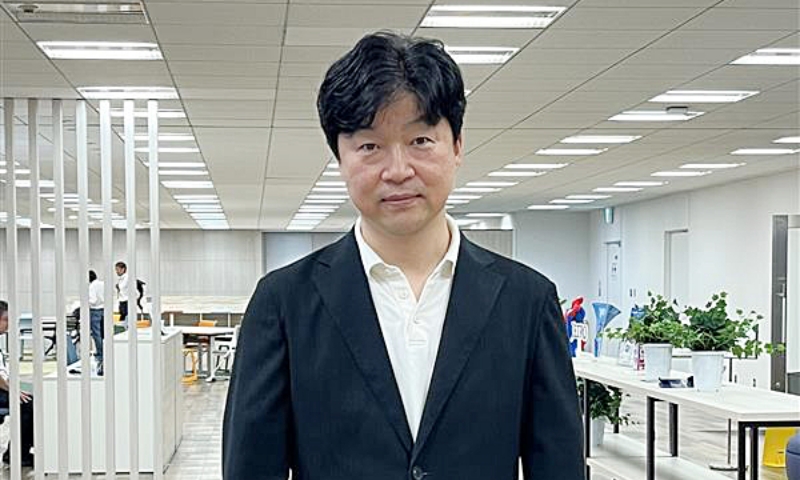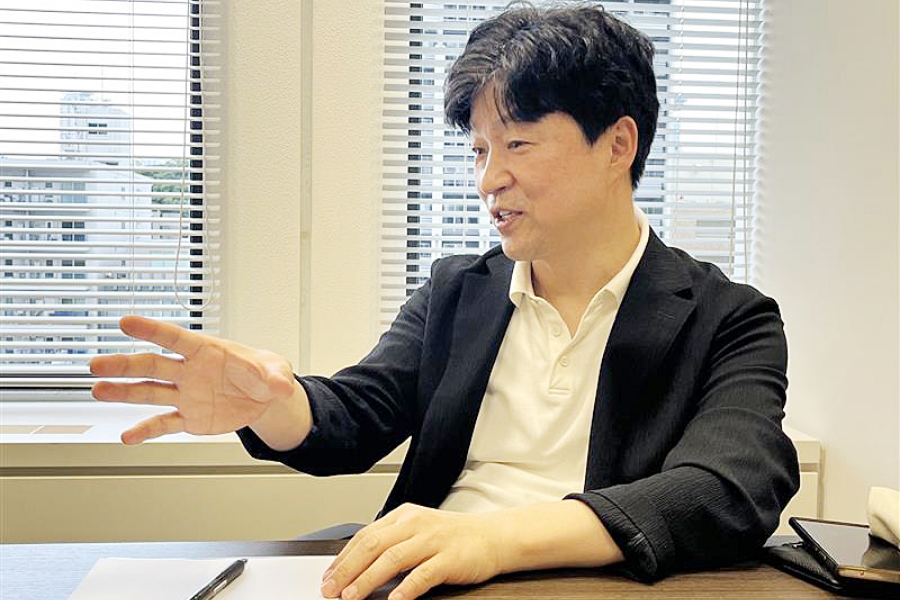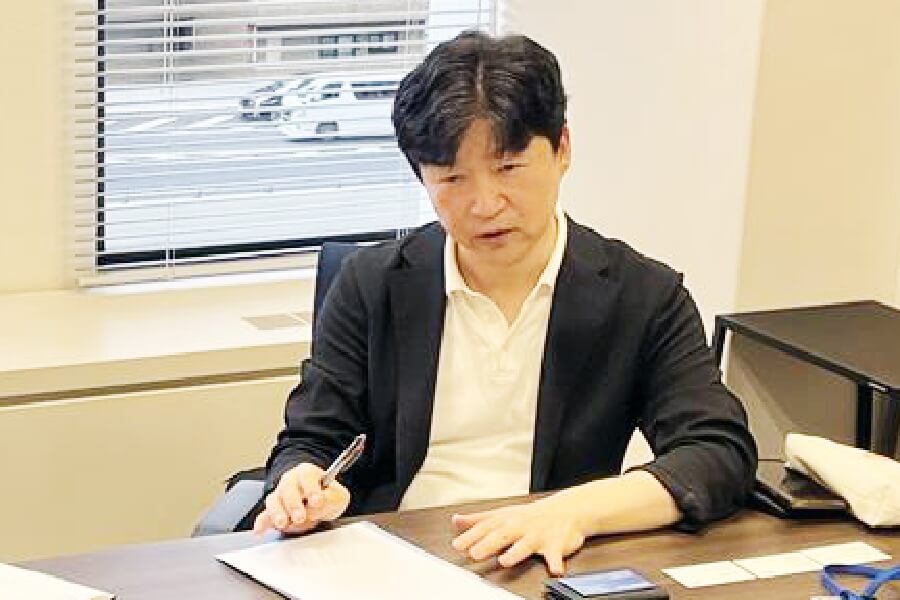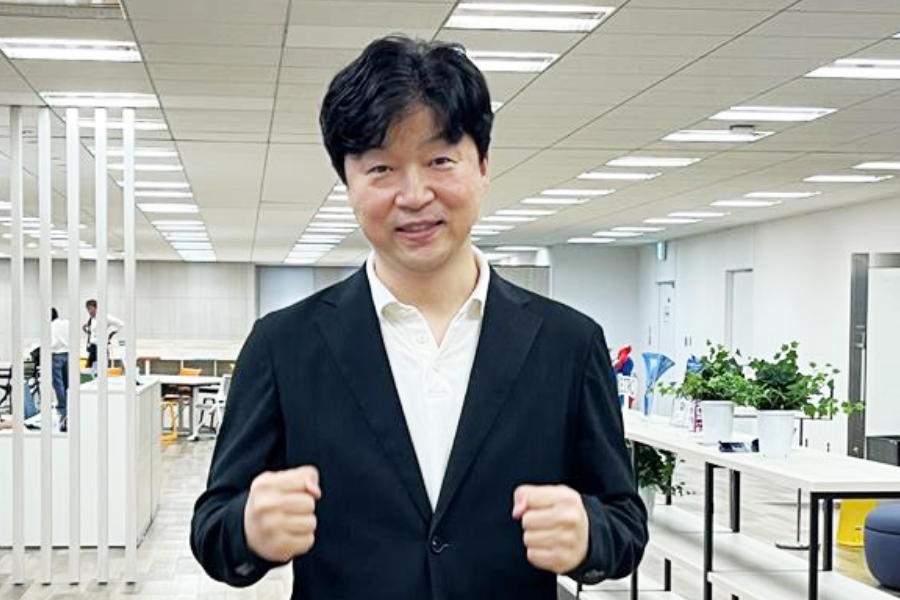
Damda Cloud Co., Ltd.
CEO, Shin Seung Min
We conducted a direct interview with Shin Seung Min, CEO of DAMDA Cloud.
Development and Provision of Cybersecurity Platform
based on AI and the Cloud
QCould you explain your services in detail?
Cyber risks have become a constant threat, as many companies, irrespective of their industry, rely on IT. Just recently, a major Korean credit card company fell victim to a cyberattack, and I believe Japan faces very similar situations.
Furthermore, cyberattacks are becoming increasingly complex and invisible, making them extremely dangerous. To prepare for attacks, traditional cybersecurity measures required purchasing separate services such as web application firewalls (WAF); endpoint detection and response systems (EDR); system monitors; security information and event management (SIEM) systems; security orchestration, automation, and response (SOAR) systems; and forensic systems, which incurred considerable costs. Moreover, due to the complexity, it was necessary to rely on major system integrators. However, all services are included in our platform, the AI-powered Plura-XDR. Furthermore, our program is small (5 MB) and can be smoothly installed in just a few minutes. Additionally, it only costs approximately 200 yen per host per month.
If you were to create a security platform on your own, it might cost hundreds of millions of yen, and you would need to understand all the complex systems involved. However, by using our cloud-based services, you can easily protect your computer from cyberattacks. With cloud services, there is no need to purchase hardware, allowing you to reduce costs by up to 95%.
Furthermore, our developers utilize AI in their daily coding activities. In addition to traditional pattern recognition, we utilize AI to analyze the behavior of unknown attacks (zero-days), enabling us to thoroughly detect threats from their beginning to end. This method continuously reduces false positives and also shortens the mean time to repair (MTTR).
QCould you describe your career path so far?
 I established a gaming company in South Korea in 2013. The game we developed became immensely popular, creating a boom in China; however, we suffered a $5 million loss due to a cyberattack originating from China.
I established a gaming company in South Korea in 2013. The game we developed became immensely popular, creating a boom in China; however, we suffered a $5 million loss due to a cyberattack originating from China.
Having originally earned a PhD in the field of cybersecurity, I devoted myself to coding day and night, aiming to create a platform that could not only establish a perimeter against virus intrusion but also detect and respond to intrusions after they occur, and in 2014, I founded Qubit Security Inc. in Korea.
QWhen did you expand into Tokyo?
In June 2025, DAMDA Cloud was established in Tokyo with 100% investment from Qubit Security Inc. In fact, in around 2020, I considered expanding into Japan, but it was not possible due to the COVID-19 pandemic. I had the opportunity to participate in SusHi Tech 2024, meet with Kiraboshi Bank, and subsequently receive a subsidy from the Tokyo Metropolitan Government. Our company is currently located in Haneda, but we plan to relocate to Shibuya in the future.
QWhen expanding overseas, what specific measures did your company implement for your products?
Our expansion into Japan is our first expansion overseas, and services for the Tokyo area are scheduled to commence in October 2025. The documents will be prepared in Japanese, and support will also be provided in Japanese. An additional important point is that, in order to meet the requirements for digital sovereignty, all data will be stored and processed domestically within Japan.
QCould you please share your future prospects?
For the next two years or so, we plan to focus on our operations in Tokyo. In the future, we aim to have our platform implemented as a proof of concept (PoC) in a major British telecommunications company.
QWhat do you expect from the Tokyo Global Connect event?
 We aim to build trust in the Japanese market and develop partnerships with major corporations, including prominent companies like NTT and Mitsubishi.
We aim to build trust in the Japanese market and develop partnerships with major corporations, including prominent companies like NTT and Mitsubishi.
We develop for enterprises, and our security platform is used by Samsung Electronics, POSCO, the Seoul Metropolitan Government, and the Metropolitan Archdiocese of Seoul in South Korea. By partnering with major corporations that have a significant customer base in Japan, we believe that we can earn the trust of more companies with our technology, which simplifies complex security measures, reduces costs, and enhances system safety and resilience.
QCould you please share a message for the Japanese companies?
 Currently, wars and crimes continue unabated around the world. And similarly, in cyberspace, we are constantly exposed to threats from hackers.
Currently, wars and crimes continue unabated around the world. And similarly, in cyberspace, we are constantly exposed to threats from hackers.
However, it is necessary to prepare rather than be fearful. We encourage you to take a look at PLURA-XDR and consider a PoC (proof of concept).
We encourage you to verify for yourself the performance, speed of implementation, and stable operations.
Case Studies

Overseas startups expanding into Tokyo
×
Tokyo companies
3-8-3 Marunouchi, Chiyoda-ku, Tokyo
Tokyo Innovation Base 1F
Square 1



